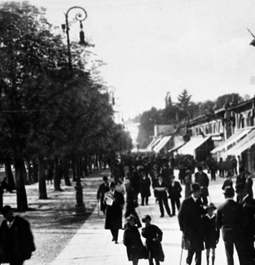Giovanni Signorelli - 1923
Small, lame and bow-legged, Giovanni Signorelli suffered from a stutter and a tendency to mumble. Working in the backroom at a cobbler’s shop, his only friend in the world was an old guitar, the sound of which – together with Signorelli’s unexpectedly deep and mellow voice – formed a marriage made in heaven.
By chance, a passer-by overheard him singing and called his friends over to listen. Rich young loafers whiling away the hours in the bars on the Sentierone, they persuaded him to follow them with his guitar to a crowded venue. Signorelli – who had never before played in front of even a single live human being – shyly began to sing one of his songs and, gradually, the room fell silent. He sang a second, then a third. Other people arrived, the room filled up. Finally, Signorelli looked up and, at the sight of so many people, stopped playing. Bravo! Bravissimo!! His little beady eyes filled with tears. His “agent” threw a hat down at his feet, which in an instant was magically full of money. From that day on, Signorelli was “Ol Merica”, the city’s bard, the voice of the truth, accuser of the rich and powerful, the poet of the poor folk. His favourite spot was in the Saint Marta woods, beneath a giant old horse chestnut tree – ‘ol piantù’ – which in 1923 was cut down. The protest ballad he wrote in response represent the first stirrings of an ecological conscience in the city: ‘N del Boschet de San Marta gh’era det ú bel piantù; [… ] i l’a mandat a rebuldù (In the woods of Saint Marta stood a fine tree [… ] they sent it toppling over).

The plants























